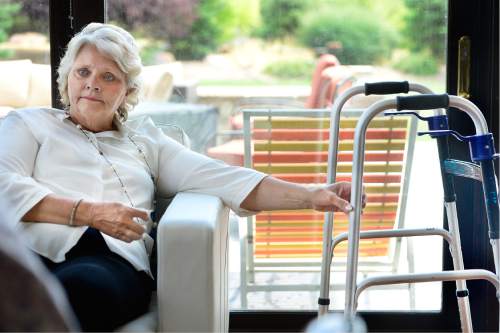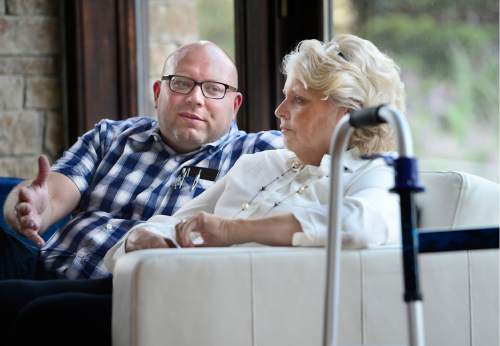This is an archived article that was published on sltrib.com in 2016, and information in the article may be outdated. It is provided only for personal research purposes and may not be reprinted.
Carolyn Ford, who uses a walker and a wheelchair to get around, was frustrated that a Utah County gas station and convenience store where she filled her tank and bought food had no van-accesible space.
The American Fork woman also has gotten stuck in the pool at her gym — which lacked steps to get in and out of the water despite a law requiring two accessible means of entry — and twice had to be lifted out by other patrons. And while going into stores with steep walkways isn't too bad, exiting them while pushing a shopping cart is "terrifying," Ford said.
"You feel like you're sliding down a hill and there's no way to stop," said Ford, 65, who suffers from pernicious anemia, which severely impairs her balance. "I've had to ask strangers if I could hold on to their arm or if they would hold on to my cart."
After multiple incidents, Ford had enough. Since April, she has brought about four dozen lawsuits in U.S. District Court accusing businesses in Lehi and American Fork of violating the Americans with Disabilities Act (ADA) and asking that they be ordered to correct their violations.
The ADA, which was signed into law in 1990, prohibits discrimination against people with disabilities and ensures they have access to places that are open to the public. The statute sets standards for accessible design such as the minimum width of ramps, the maximum amount of force needed to open a door, the signs required to designate van-accessible parking spaces and the placement of handrails.
Ford's goal is to get ADA violations fixed at the businesses she frequents so all people can have access to their goods and services. She pays a court filing fee of $400 for each suit.
Attorney Adam Ford — Carolyn Ford's son who, along with attorney Matthew B. Crane, represents his mother in the suits — said every entity they have sued had significant violations. Settlements have been reached in some of the cases, he said, and the litigation already is showing results.
"Construction crews are renovating businesses up and down State and Main in Lehi and American Fork ensuring safe access for disabled members of our community," Adam Ford said.
The Fords first tried to get violations fixed by sending letters to businesses where Carolyn Ford encountered significant barriers, but got no response. The lawsuits were necessary because "a compliance request letter has never been enough motivation to get a business to rip up the concrete and do construction," according to Adam Ford.
"If defendants work with us, and the vast majority have, the case can typically be settled in a matter of weeks for a few thousand dollars," the attorney said. "Often we work with defendants to come up with remediation plans that are less expensive and less onerous than what they fear when they first are served with our suit."
Under the ADA, successful plaintiffs recover their attorney fees from the noncompliant party. In addition to the fees and correction of the ADA violations, Ford said, they generally ask for just a few hundred dollars in damages for his mother.
Carolyn Ford does not sue over minor offenses, such as a ramp that is just a little too steep, her son said. According to her lawsuits, the significant violations that have hindered her access include a disabled-accessible parking space with a large drain, no access aisle and a 5.6 percent slope, which is supposed to be level; a nearly 17 percent slope going into a store; and a tall step-up entrance to an office building with no ramp or accessible entrance.
Now that a number of suits have been filed, Adam Ford hopes letters alone might prompt businesses to correct their violations.
"The ADA has been around since 1990," he said. "Businesses have had 26 years to get into compliance. Disabled people shouldn't have to beg for equal access."
Twitter: @PamelaMansonSLC —
The ADA
The Americans with Disabilities Act (ADA) was signed into law July 26, 1990, by President George H.W. Bush. The Justice Department describes the act — which prohibits discrimination and guarantees that people with disabilities have the same opportunities as everyone else to participate in mainstream American life — as one of the nation's most comprehensive pieces of civil rights legislation.
Source: U.S. Department of Justice, Civil Rights Division







